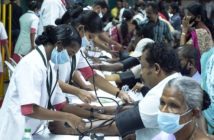As Diwali approaches, air quality concerns are especially pressing for those with respiratory conditions in Mumbai. The increased use of firecrackers releases a variety of harmful pollutants, including particulate matter (PM2.5 and PM10), sulfur dioxide (SO2), nitrogen dioxide (NO2), and heavy metals, which can exacerbate symptoms in people with asthma, bronchitis, and other respiratory ailments.
Why Firecrackers Affect Air Quality
During Diwali, air pollution surges due to fireworks and other celebratory activities. Particulate matter from these sources, which can remain airborne for long periods, irritates the respiratory system, leading to coughing, wheezing, and shortness of breath. For individuals with pre-existing lung issues, prolonged exposure can lead to serious complications and sometimes hospitalization.
Tips for Respiratory Protection During Diwali
For those with respiratory issues, here are some practical ways to minimize exposure and manage symptoms during the festival:
- Limit Outdoor Exposure: During peak hours of firecracker activity, staying indoors can help reduce direct exposure to pollutants. Consider avoiding outdoor events or gatherings during this time.
- Use Air Purifiers: An air purifier with a HEPA filter can capture harmful particles and improve indoor air quality. Running an air purifier in high-traffic indoor spaces, especially during and after Diwali celebrations, can significantly reduce pollutants.
- Wear a Quality Mask: Masks like the N95 or N99 are effective in filtering out fine particles. If you need to go outdoors, especially near fireworks, wearing one can greatly reduce inhaled pollutants.
- Stay Hydrated: Drinking water helps to maintain mucosal linings in the respiratory tract, which can help prevent irritation from airborne toxins.
- Breathing Exercises: Practicing deep breathing exercises strengthens lung capacity and helps the body manage respiratory stress. Techniques like diaphragmatic breathing and breath-counting exercises are particularly beneficial.
- Monitor Air Quality: Apps that provide real-time air quality updates, such as the Air Quality Index (AQI), allow you to gauge outdoor safety. Planning activities around AQI reports can help you avoid high-exposure times.
Consult a Healthcare Provider
If you have an existing condition like asthma or chronic obstructive pulmonary disease (COPD), consult your doctor ahead of Diwali. They may advise adjusting your medications or implementing additional measures to safeguard your respiratory health.
Diwali’s vibrant festivities are a cherished tradition, but by taking these proactive steps, Mumbaikars with respiratory sensitivities can enjoy the season while minimizing health risks.






